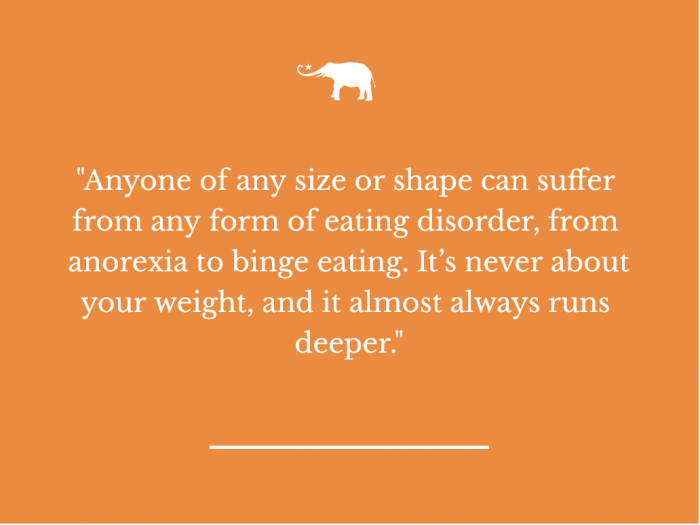With all the discussion around eating disorders being in relation to anorexia nervosa, it can be easy to forget that other eating disorders do exist.
Binge eating disorder is among those commonly forgotten and has been in people’s lives just as long as any other form of disordered eating. However, it wasn’t until 2013 that BED was added to the diagnostic manual (DSM-V) used by medical professionals. Sadly, this means that there is still a disproportionate amount of stigma attached to the eating disorder, and treatment is inadequate at best.
Unfortunately, doctors may still fail to recognise that those with BED are suffering from a legitimate eating disorder. It’s not uncommon for your GP to suggest practicing “self-control” or “going on a diet” as a means to repair BED. These misconceptions are not only problematic, but they also feed into the idea that “thinner bodies are better.”
If you live in a bigger body, then you must have no self-control/respect, right? Incorrect. Anyone of any size or shape can suffer from any form of eating disorder, from anorexia to binge eating. It’s never about your weight, and it almost always runs deeper.
Five things no one tells you about binge eating disorder:
1. Weight loss strategies alone won’t be enough to tackle binge eating disorder.
While weight loss may need to be suggested, and with it the usual advice to count calories, exercise, and to drink more water, it’ll not help with binge eating in the long run. For many people, weight loss alone will not be sufficient, and in some cases, it might not even be necessary.
The issue, as mentioned, runs deeper than simply binge eating. Eating disorders are mental illnesses, and usually indicate a deeper traumatic and emotional issue that needs to be addressed. It’s not and never has been as simple as “you need to practice self-control and stop eating so much.” Sadly, this is a common and dangerous misconception upheld by medical practitioners and society alike.
2. Cognitive Behavioural Therapy or working with a therapist in some capacity will help you tackle the bigger issue.
Cognitive behavioural therapy (CBT), alongside other forms of therapy, are frequently recommended for eating disorders treatment. Personally speaking, I found therapy to be the key in fighting against anorexia nervosa and bulimia nervosa. Without it, my weight and body would have changed, but my mind would have been unable to cope, therefore triggering the inevitable relapse. Through the use of therapy, we’re taught how to reshape our thinking patterns and become better equipped to deal with intrusive thoughts.
While the thinking may not change entirely, we’re given the tools to help us overcome the need or the want to relapse into disordered eating. Whether it be binging or starvation.
3. Effective treatment for binge eating disorder can be intensive and a long process.
Like recovery from any mental illness, it can be long and strenuous. Eating disorder treatment is especially difficult. Unlike other addictions such as drugs or alcohol, the opportunity to avoid food or eating isn’t there. You will be constantly faced with food and the need to eat, while also conflicted. This is why it’s especially hard to recover from an eating disorder of any kind. But, it is possible with the correct support, determination, and, in some cases, medication.
4. Recovery requires a holistic approach, not [insert popular diet cult here].
While your GP may (wrongfully) point you in the direction of the latest dieting trend, this is not the answer. While it might help you move a few kilos in the beginning, it will almost definitely plunge you into a diet-restrict-binge cycle.
Without the help of therapy, understanding the root of your binge eating, addressing them, and, possibly, working with a registered dietician, the cycle may only continue.
5. It’s not your fault.
An eating disorder is no one’s fault. No one wants to have one, and no one dreams about being consumed by one. Just like obtaining a physical injury, it’s not a choice to put yourself through such emotional and mental pain. But yet so many people fail to acknowledge this. Even the sufferer.
Stigma surrounding mental illness of types is still rampant. Quite often, we find that society can view those with mental illness as lazy, incompetent, or attention-seeking. But, quite often, laziness is the inability to get out of bed due to crippling depression, or the inability to work due to severe anxiety or even an eating disorder.
Even the symptoms of certain mental illnesses and their respective medications can significantly change how we operate and work. Our incompetence could be fear or brain fog, while our “attention-seeking” behaviour may be a desperate attempt for help.
No matter what the mental illness, the fact remains the same: it’s not your fault. Once we accept this, we can begin to heal.
~













Read 1 comment and reply